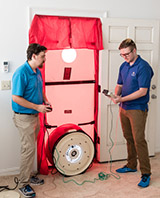Recruiting Commercial Buildings for Energy Evaluation Field Study

Commercial buildings commonly have missed opportunities for energy efficiency. |
We are actively recruiting newly-constructed buildings for our energy evaluation field study. In this project, researchers will assist in developing and field testing a methodology to accurately and cost-effectively measure the opportunity for energy and cost savings through increased energy efficiency in commercial buildings. Researchers will also develop training and educational materials to address commonly missed opportunities for efficiency.
Eligible buildings will meet the following criteria:
- Built in Central and North Florida
- Permitted under 2014 FL energy code
(permitted 7/2015 or later)
- Constructed primarily as non-medical office space or retail space (except those >10% food)
In compensation for participation, we offer building owners free energy evaluations. If you own, manage, or lease a building that meets these criteria, please contact Karen Fenaughty at kfenaughty@fsec.ucf.edu or 321-638-1474.
New EnspectorPro website makes reporting, managing and verification of building envelope testing easy.
Blower door testers and building officials have a new online tool for expediting test results and approval. The tester can enter the test results from the field and the website produces a Florida air tightness test report that can be sent to builders and building departments. Testers can enter their credentials, which can be reviewed by building officials. Reports are archived for three years. Learn more at EnspectorPro.com
EnergyGauge USA – Now 4 Methods for Computing Florida Energy Code
The latest version of EnergyGauge USA computes the Florida Energy Code by the performance method, the R-value prescriptive method, the UA tradeoff method and the new Energy Rating Index (ERI) method. EnergyGauge USA Product Features
PUBLICATIONS
Meeting the Variable Needs of Energy-Efficient Mechanical Ventilation When and Where You Need It

Figure 1. Supply flowrate of LC Unit with CO2 control during a school day. White space within rectangle indicates periods when ventilation was reduced from the fixed-flow at 2,500 cfm. |
During the summer and fall of 2016, a study was conducted by FSEC's Chuck Withers to compare the performance of an existing fixed-capacity DOAS to the Addison LC unit with CO2 demand-based control. A test site was chosen that had a variable occupancy schedule, an existing fixed-flow DOAS that could be replaced, and that could accommodate a retrofit within the time constraints of the study period. The study was completed at an Orlando private high school cafeteria building. PAPER
Field and Laboratory Testing of Approaches to Smart Whole-House Mechanical Ventilation Control
Smart ventilation system could reduce residential energy costs.
FSEC has been developing smart algorithms for hot humid climate applications for whole-house residential ventilation systems. Whole-house ventilation systems are required for very tight houses in building codes and recommended for improved air quality in many homes. However, bringing in air during peak hot and humid weather can increase heating and cooling bills. Using smart controls, the energy costs can be reduced. This Department of Energy Building America-funded project led by FSEC researchers Eric Martin, Karen Fenaughty and Danny Parker with contributions by Michael Lubliner and Luke Howard of Washington State University, examines field, lab and simulation work of three methods of smart ventilation. ABSTRACT | PAPER
Data on Cost-Optimal Nearly Zero Energy Buildings (NZEBs) Across Europe
FSEC's Danny Parker coauthored this evaluation of near zero energy homes (NZEBs) in Europe for European Commission. ARTICLE
Evaluating Moisture Control of Variable-Capacity Heat Pumps in Mechanically Ventilated, Low-Load Homes in Climate Zone 2A
This Department of Energy Building America-funded project conducted by FSEC researchers Eric Martin, Chuck Withers, Janet McIlvaine, David Chasar and David Beal evaluates the performance of three emerging strategies using variable-capacity systems to maintain whole-house comfort in low-load, mechanically vented homes:
• A centrally ducted, small-duct high-velocity (SDHV), variable-capacity heat pump
• A centrally ducted, minisplit heat pump with cassette air handling unit
• A ductless multisplit system using transfer fans to control temperatures in bedrooms.
PAPER
Course Spotlight
Blower Door Training, Energy Code Training, and Whole-House Mechanical Ventilation Measurement Training Offered in 6 Florida Cities
Ft. Lauderdale • Ft. Myers • Pensacola • Tampa • Gainesville • Cocoa
Register now, Space is limited!
|





